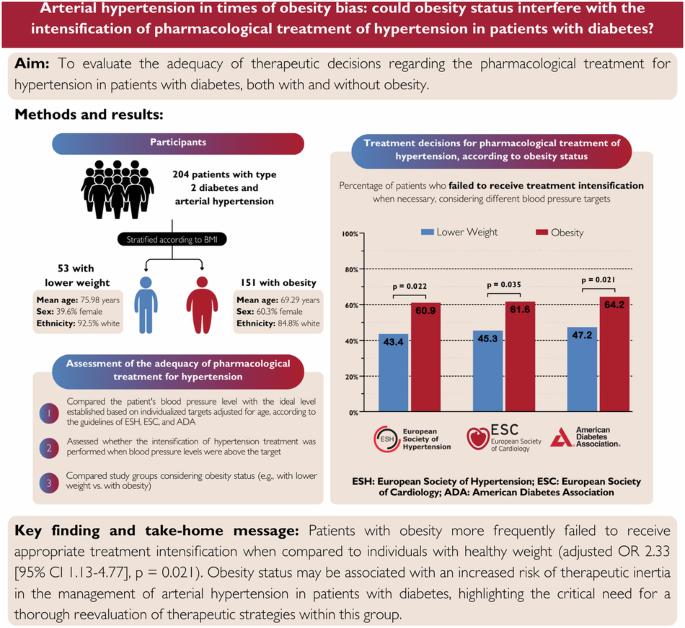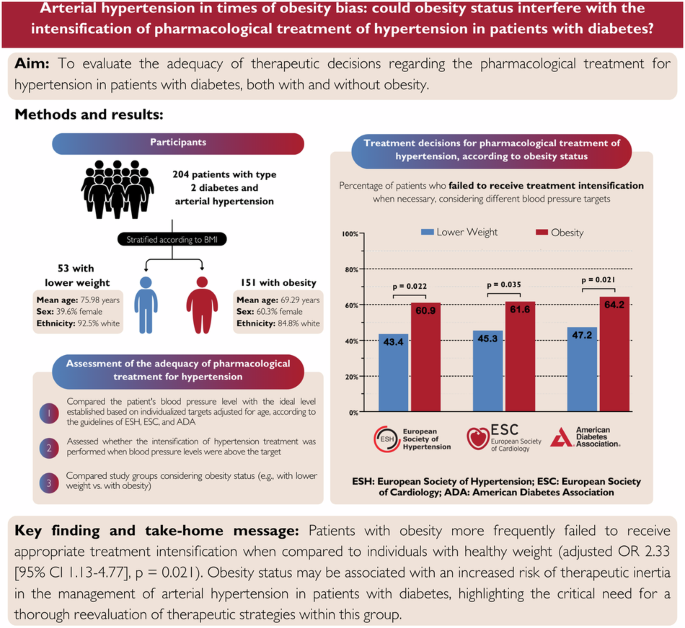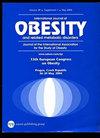隐藏的障碍:高血压治疗中的肥胖偏见。
IF 4.2
2区 医学
Q1 ENDOCRINOLOGY & METABOLISM
引用次数: 0
摘要
背景和目的:肥胖症患者经常面临肥胖偏见,这可能会影响适当医疗护理的提供。我们的目的是评估有无肥胖症的糖尿病患者高血压药物治疗决策的适当性:这是一项多中心横断面研究,研究对象是在巴西南部接受门诊治疗的 2 型糖尿病和动脉高血压患者。研究人员根据体重指数(BMI)将患者分为两组:体重较轻(BMI 结果)、体重较重(BMI 结果)和体重较重(BMI 结果):这项研究包括 204 名参与者,其中 53 人体重较轻,151 人肥胖。与体重较轻的患者相比,肥胖症患者更经常未能得到适当的强化治疗。当考虑到三个协会的血压目标时,研究组之间出现了差异:ESH(调整后 OR 2.28 [95% CI 1.12-4.63],p = 0.022)、ESC(调整后 OR 2.13 [95% CI 1.05-4.31],p = 0.035)和 ADA(调整后 OR 2.33 [95% CI 1.13-4.77],p = 0.021):这些研究结果表明,肥胖患者在高血压治疗中可能面临潜在的差异,肥胖状况可能与该群体动脉高血压治疗中的治疗惰性有关。本文章由计算机程序翻译,如有差异,请以英文原文为准。


Hidden barriers: obesity bias in hypertension treatment
Individuals with obesity often face obesity bias, which may influence the delivery of appropriate medical care. Our aim is to evaluate the adequacy of therapeutic decisions regarding the pharmacological treatment for hypertension in patients with diabetes, both with and without obesity. This is a multicentric cross-sectional study of patients with type 2 diabetes and arterial hypertension who received outpatient care in Southern Brazil. Participants were stratified into two groups according to their body mass index (BMI): lower weight (BMI < 25.0 kg/m2) and with obesity (BMI ≥ 30.0 kg/m2). The primary outcome evaluated was the difference in pharmacological treatment decisions for hypertension between groups, considering individualized hypertension targets from American Diabetes Association (ADA), European Society of Hypertension (ESH), and European Society of Cardiology (ESC) guidelines. Data were analyzed as a binary endpoint (failure to receive treatment intensification vs. receiving treatment intensification when necessary) and groups were compared using multivariable logistic regression. This study included 204 participants, of which 53 were at a lower weight and 151 had obesity. Patients with obesity more frequently failed to receive appropriate treatment intensification when compared to individuals with lower weight. The differences between the study groups were observed when considering the blood pressure target of three societies: ESH (adjusted OR 2.28 [95% CI 1.12–4.63], p = 0.022), ESC (adjusted OR 2.13 [95% CI 1.05–4.31], p = 0.035), and ADA (adjusted OR 2.33 [95% CI 1.13–4.77], p = 0.021). These findings suggest that patients with obesity may face potential disparities in hypertension management, and obesity status may be related to therapeutic inertia in the management of arterial hypertension in this group.
求助全文
通过发布文献求助,成功后即可免费获取论文全文。
去求助
来源期刊

International Journal of Obesity
医学-内分泌学与代谢
CiteScore
10.00
自引率
2.00%
发文量
221
审稿时长
3 months
期刊介绍:
The International Journal of Obesity is a multi-disciplinary forum for research describing basic, clinical and applied studies in biochemistry, physiology, genetics and nutrition, molecular, metabolic, psychological and epidemiological aspects of obesity and related disorders.
We publish a range of content types including original research articles, technical reports, reviews, correspondence and brief communications that elaborate on significant advances in the field and cover topical issues.
 求助内容:
求助内容: 应助结果提醒方式:
应助结果提醒方式:


